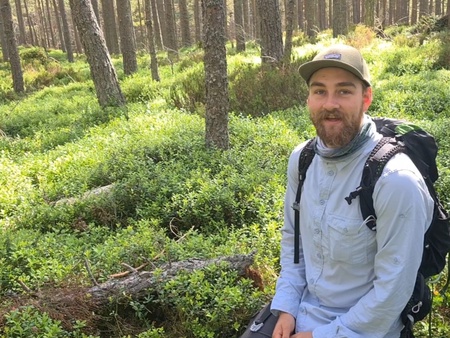Researchers might have solved the riddle of how to save one of Scotland's most iconic protected species from eating another.
The capercaillie is a ground-nesting bird that, with just over 500 left in the wild, is in danger of extinction in the UK. One contributor to its decline is the eating of eggs and chicks by predators including another protected species, the pine marten.
Now a trial in the Cairngorms which involved placing artificial nests filled with chicken’s eggs and leaving deer meat in strategic locations to feed hungry predators and discourage them from further foraging during the breeding season, has seen an increase of 83% in nest survival.
The research, newly published in the British Ecological Society’s Journal of Applied Ecology, shows this sort of diversionary feeding could be a significant contributor to saving the capercaillie from extinction. As a result of the study, it is already being rolled out by Forestry and Land Scotland (FLS), the RSPB Scotland and other partners in Deeside.
PhD researcher Jack Bamber from the University of Aberdeen’s School of Biological Sciences led the study, supervised by ecologists from the universities of Aberdeen and St Andrews, alongside FLS.
Part of the Cairngorms Connect Predator Project, the research was conducted across 60sqkm of land managed by the Cairngorms Connect Partnership.
“A major obstacle in effective conservation management is the conflict between recovering predators eating endangered prey. This challenge is becoming commonplace in the era of ecosystem restoration. In Scotland the much-celebrated recovery of the pine marten, a nest predator, and the conservation of one of its potential prey, the capercaillie, epitomises this issue,” said Jack.
“Some often advocate for lethal predator control, which isn’t desirable for protected species, so alternative conservation interventions are needed.
“Diversionary feeding, a non-lethal intervention strategy, is a potential solution to this conflict but direct evidence that it leads to significant reductions in nest depredation pressure was lacking.
“Our idea was to fill the bellies of pine martens and other predators, like badgers, in capercaillie strongholds, predicting that once full of free food they would no longer search for eggs.”
Working in partnership with land managers in the Cairngorms National Park, the team placed 720 artificial nests filled with chicken eggs in historic capercaillie habitat. Half of them had diversionary feeding stations with deer carrion set up nearby and the survival of the nests were monitored over an eight week period.
“It is the first time this method has been trialled directly to alleviate ground nest predation and the results showed that diversionary feeding, deployed specifically during the breeding season, increased the chance of a nest surviving by 83% compared to the nests without carrion available,” added Jack.
“This suggests that reducing nest predation pressure through diversionary feeding could contribute to more successful capercaillie breeding.
“Importantly, diversionary feeding of pine martens and badgers at key times of the year can achieve positive conservation outcomes without lethal control of protected predators.
“Our study provides a timely solution for a conservation emergency, with implications for any place capercaillie call home.”
The research is the result of a partnership between the University of Aberdeen, the University of St Andrews, FLS, RSPB Scotland, NatureScot and Wildland Ltd,working under the umbrella of the Cairngorms Connect Predator Project.
Kenny Kortland, wildlife ecologist with FLS and lead of the Cairngorms Connect Predator Project, said: “Predators are an important part of Scotland’s biodiversity but they can have a negative impact on rare species in certain circumstances. This exemplary research has provided strong evidence that we can reduce the impacts of predators without resorting to killing them. FLS and other managers are now rolling out this diversionary feeding to help capercaillie.”
Richard Mason, site manager at RSPB Scotland Abernethy, said “Capercaillie are struggling in Scotland and we need innovative solutions to be developed and implemented quickly for their populations to recover. Through dedication and collaboration, this project has been conceived, delivered, tested and rolled out on a landscape scale in less than four years.
“We are delighted that RSPB Scotland Abernethy Forest was included in the trial area. The number of capercaillie here has been increasing in recent years and diversionary feeding has likely contributed to this increase. We hope that, alongside habitat restoration and other work, diversionary feeding helps to secure a future for Capercaillie in Scotland.”
The project was funded by NERC and the School of Biological Science at the University of Aberdeen through the Scottish Universities Partnership for Environmental Research Doctoral Training Partnership, and Forestry and Land Scotland, with support from Wildlands Ltd and RSPB Scotland.


